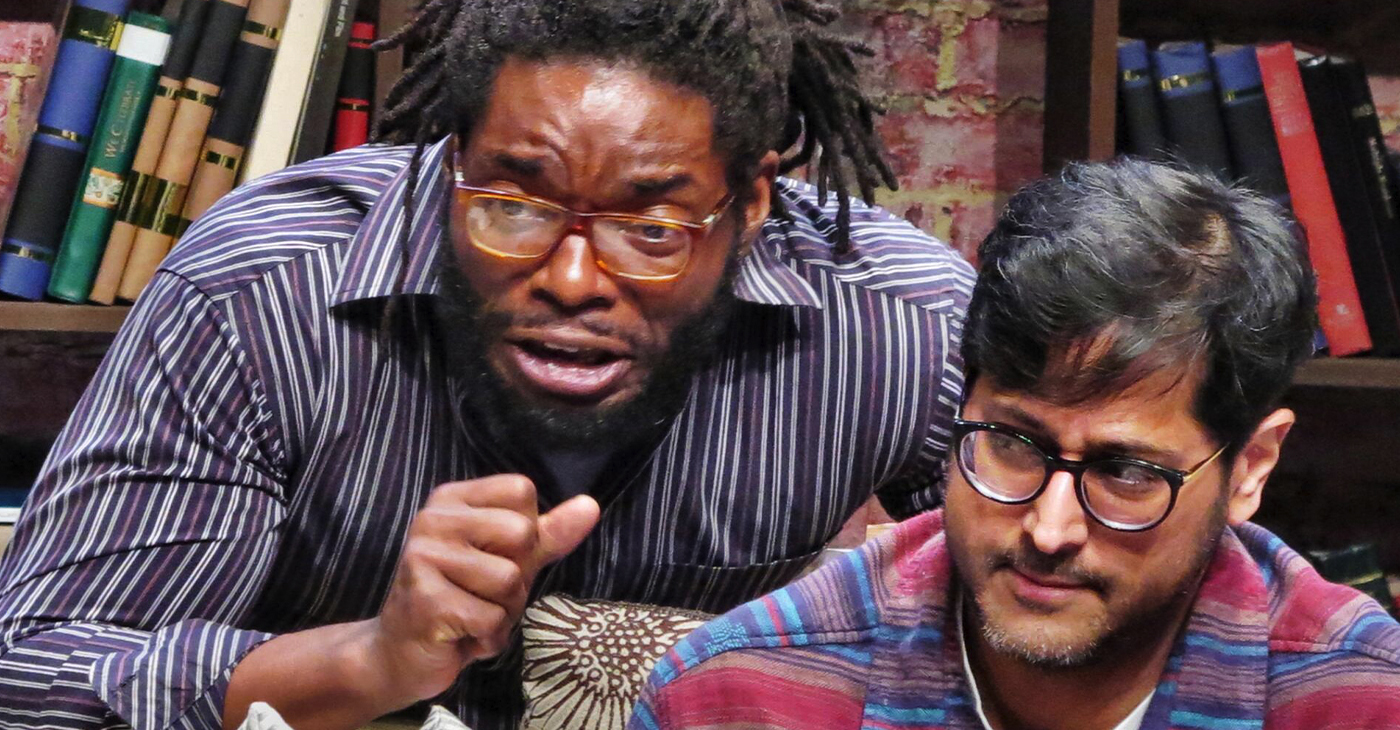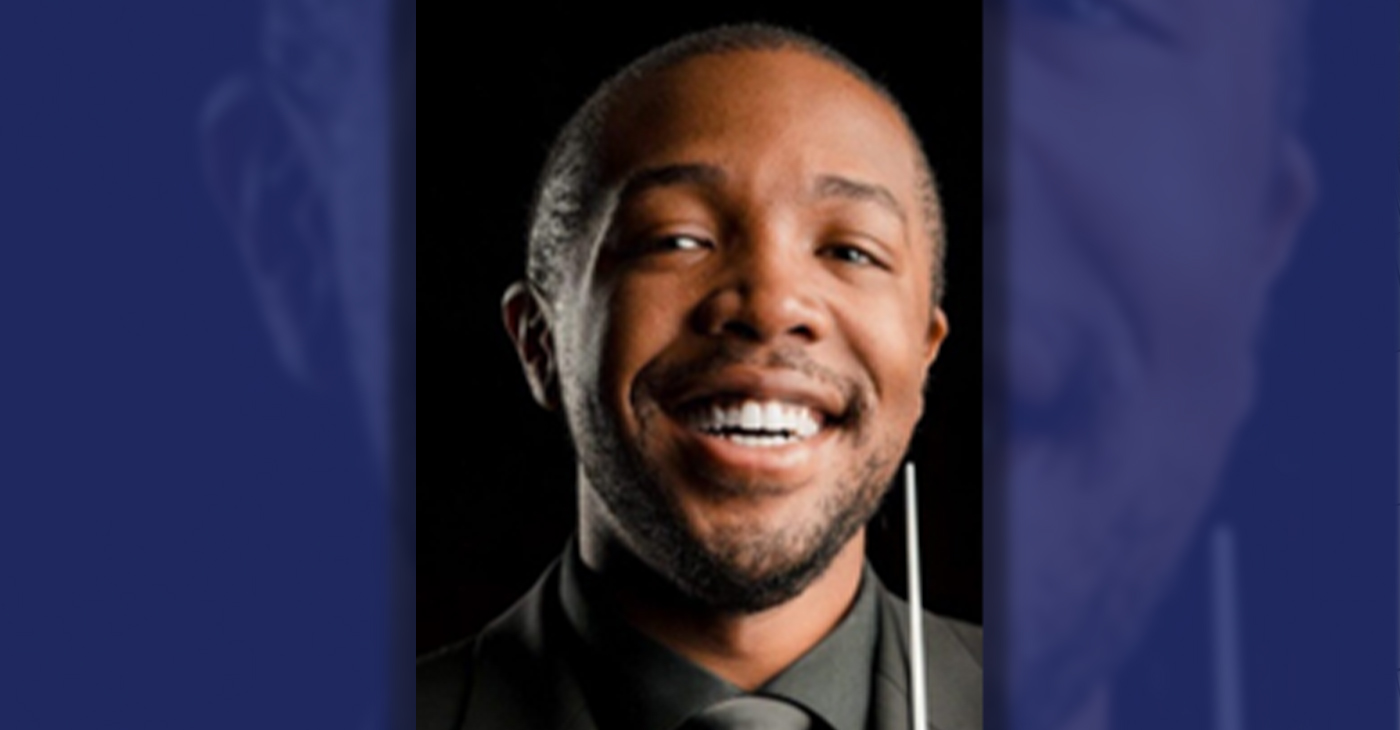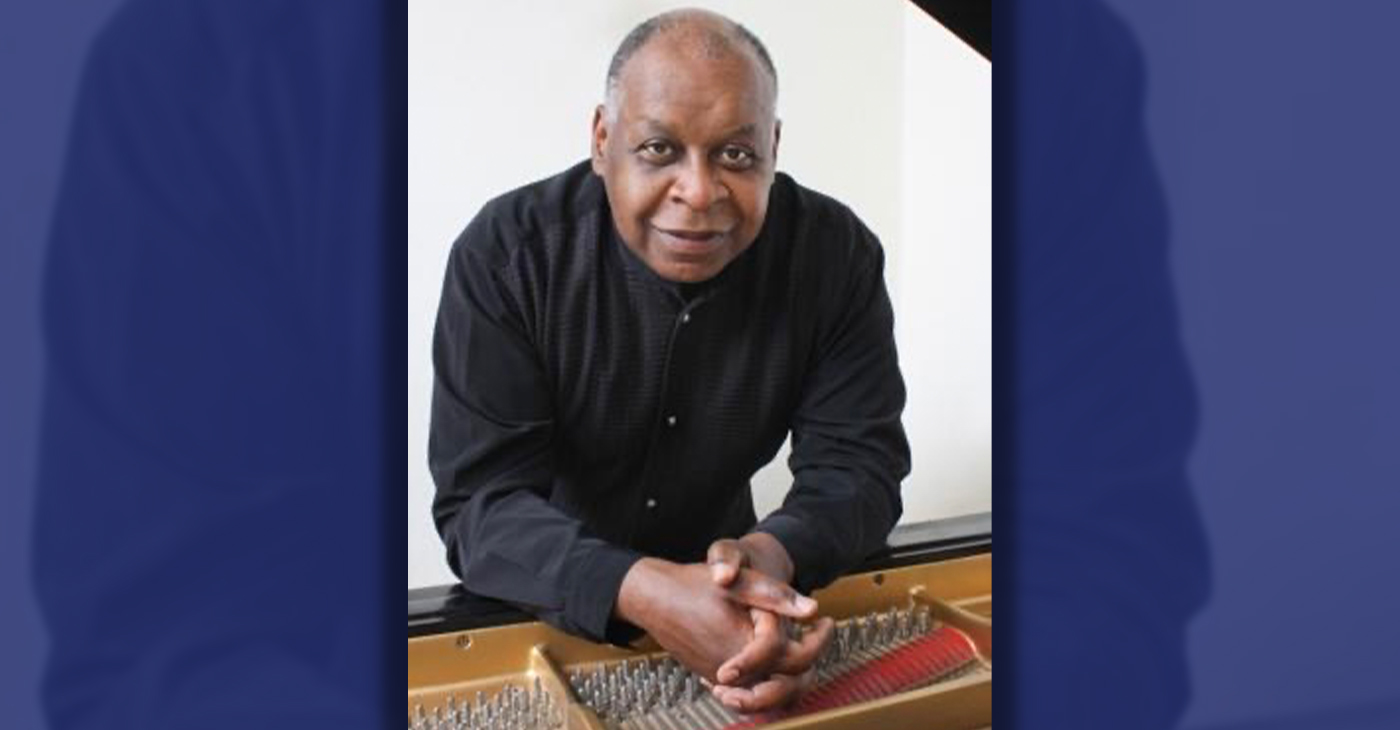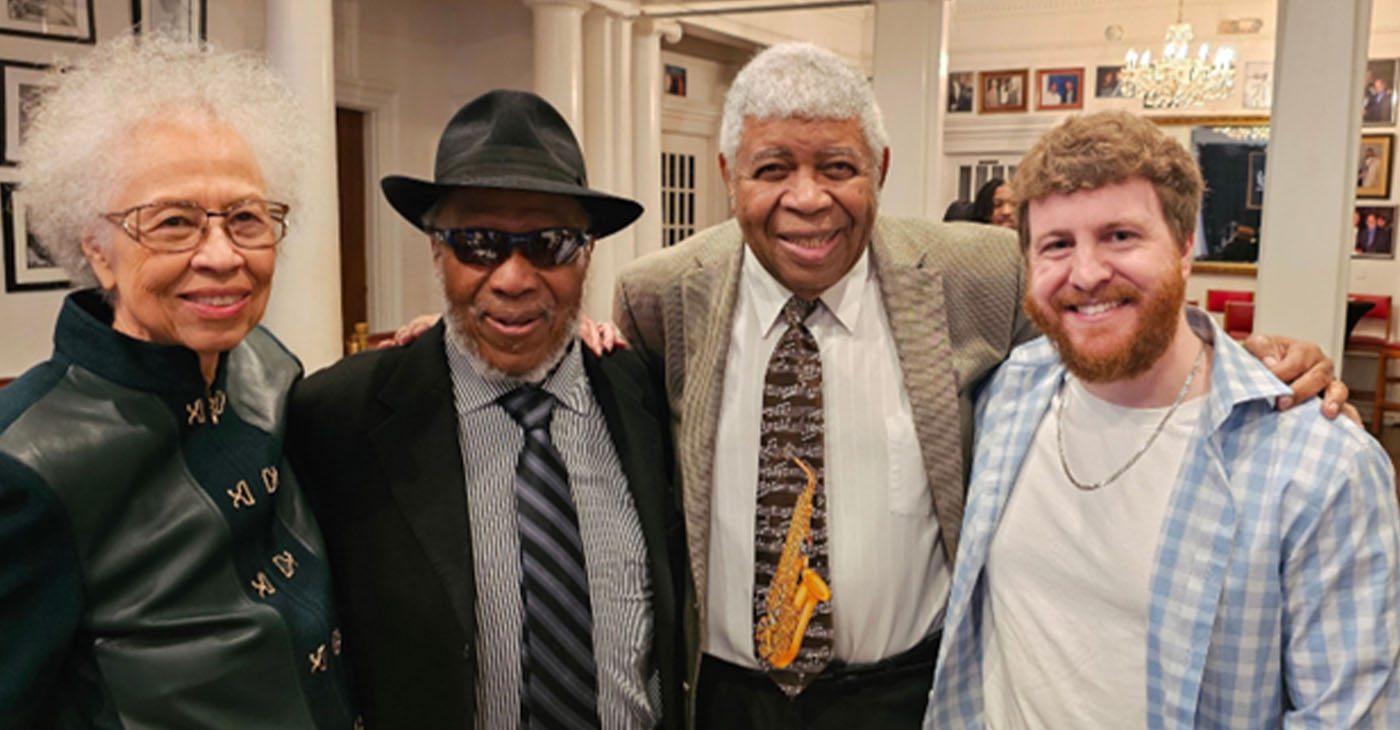Arts and Culture
COMMENTARY: Note From New York As Reed’s “The Conductor” Completes Off-Broadway Run
If “The Conductor” never plays again, I will have been privileged to be part of its evolution from Zoom readings from a year ago to two full off-Broadway runs in 2023. That’s six weeks of live shows, 24 shows in all. But wouldn’t it be nice to have the show satirizing the Bay Area’s race politics actually have a run in the Bay Area?

By Emil Guillermo
Oakland resident Ishmael Reed’s 11th play, “The Conductor,” came to a close last week in New York.
If “The Conductor” never plays again, I will have been privileged to be part of its evolution from Zoom readings from a year ago to two full off-Broadway runs in 2023. That’s six weeks of live shows, 24 shows in all.
But wouldn’t it be nice to have the show satirizing the Bay Area’s race politics actually have a run in the Bay Area?
That would make it a homecoming of sorts for Kenya Wilson, who spent her early years in the Bay Area, the daughter of two members of the Black Panther Party, Walter and Tracy Wilson.
One of the perks of doing the show is being part of such a great group of actors. None of the cast members are household names yet. All are working, paid, professional actors still pursuing their dreams.
Wilson was part of a cast that included Brian Anthony Simmons as Warren Chipp, a fired SF Bay Area columnist; Sri Chilukuri as Shashi Parmar, an Indian American activist in the San Francisco school board recall; Monisha Shiva as Kala Parmar, a lecturer in women’s studies at a local college; Laura Robards and me as conservative television commentators Hedda Duckbill and Gabriel Noitallde.
A play about a diverse America should have a diverse cast, including understudies Joy Renee, Humzah Akbar, and Aaron Watkins.
I should note, Reed has cast me, a Filipino American, in all of the white roles (voice over only).
And then there was Wilson, who played reporter Melody Wells, fitting because Reed has subtitled the play “A Living Newspaper” after a 1930s WPA project where artists and writers took the subtext of the news into the theater to create informative and provocative works that took its cues from society as it unfolded.
And that adds to the significance of Wilson’s role in the play as a Black woman journalist. Not only does she get to spout the poetic literary lines of Reed, but she also gets to lay out factual information on Black women that makes audiences see her as their champion.
As an actress, Wilson admits she only knew about some of the powerful things she was given in Reed’s writing. She knew about the now-deceased writers Bell Hooks, Ntozake Shange, and Toni Morrison. But she also realized how politicized the education system is in America, as to who gets taught what ideas, and what ideas are simply ignored.
Black women, generally, are ignored.
“When it comes to Black women, we are on the bottom of the totem pole,” Wilson said. “I feel when we voice our experiences people don’t want to hear it, and they just assume that we’re all just complaining.”
In her one big scene, Wilson is not complaining but rather making the case for Black women.
“For instance … unintended pregnancies for African American women are 19 times higher than those of white women,” Wilson said. So are chlamydia and gonorrhea infection rates, as well as rates of cervical cancer and breast cancer. “And all of these things are reproductive and sexual in nature. And it just takes me back to times when my ancestors were enslaved, and we were there to breed for more slaves,” Wilson said. “And it’s not a coincidence to me that we have a higher chance of dying in childbirth. None of this is a surprise to me because this is a country that doesn’t care about Black people.”
Wilson’s key scene is a “debate” with an Indian American woman about the plight of Dalits, or lower caste “untouchable” women. Wilson always wins the audience back when, after the hearing about the plight of Dalits, Wilson responds, “Being a Black woman is no lottery prize.”
It’s a line that should also win back critics of Reed from years past who saw him as somehow anti-feminist.
“Definitely not this play,” said Wilson, who has already appeared in multiple productions this year, and is scheduled to appear in another play in Philadelphia. After a 14-year respite from acting, she’s been back at it the last six years and hopes to be on Broadway soon.
But she would definitely welcome a part in the further evolution of “The Conductor.”
Reed’s dubbing the play a “living newspaper,” is instructive. That may be the conceit that keeps “The Conductor” alive, with new iterations written by Reed and performed by a stable cast in real time, telling the story of America’s changing racial politics.
But would that be on some grassroots stage in the Bay Area? Or digitally via podcast or as radio drama?
Oakland resident Ishmael Reed’s “The Conductor” has closed off-Broadway for now, but its future is wide open.
Emil Guillermo is a journalist and commentator. His one-man theater performance, “Emil Amok, Lost NPR Host: A Phool’s Filipino American History,” runs on Sept. 14 @930pm Eastern in New York this week.
Arts and Culture
Kedrick Armstrong: New Music Director for the Oakland Symphony
The Oakland Symphony Announced Kedrick Armstrong as its Next Music Director. In addition to conducting the orchestra’s public concerts, Armstrong will also actively participate in the Oakland Symphony’s many education and community engagement programs, designed to inspire a love of music in people of all ages.

By Post Staff
The Oakland Symphony Announced Kedrick Armstrong as its Next Music Director.
In addition to conducting the orchestra’s public concerts, Armstrong will also actively participate in the Oakland Symphony’s many education and community engagement programs, designed to inspire a love of music in people of all ages.
Armstrong is the successor to previous music director and Conductor Michael Morgan, who passed away in 2021 after a 30-year tenure at the Symphony.
Armstrong will open the Oakland Symphony 2024-2025 season on October 18.
Armstrong, who is 29 and hails from Georgetown, South Carolina, is currently the creative partner and principal conductor of the Knox-Galesburg Symphony.
The Chicago Tribune has praised Armstrong for his ability to “simply let the score speak for itself.” He enjoys a wide range of repertoire, spanning early music to premiering new works, using his joy and curiosity for all music to cultivate understanding and collaboration within diverse communities.
“I am deeply honored and grateful for the opportunity to serve as the new music director of the Oakland Symphony,” Armstrong said. “As a Black conductor, I find it humbling to stand on the shoulders of both Michael Morgan and Calvin Simmons,” the most recent and the first African American music directors of the Symphony, respectively.
Armstrong led three programs at the Symphony between 2022 and early 2024, which showcased his broad knowledge of the classical repertoire and enthusiasm for spotlighting diverse voices.
On his Oakland Symphony subscription debut on Feb. 16, Armstrong led the world premiere of “Here I Stand: Paul Robeson,” an oratorio by Carlos Simon on a libretto by Dan Harder, commissioned by the Oakland Symphony.
Armstrong was selected unanimously by the Oakland Symphony’s board of directors and musicians after an extensive two-year search. “The search committee was overwhelmed by Kedrick’s scholarship and curiosity about all kinds of music, from classical and jazz to gospel and hip-hop,” said. Dr. Mieko Hatano, executive director of the Oakland Symphony. “We are thrilled to have him join us at the Oakland Symphony.”
Arts and Culture
Faces Around the Bay Dr. Carl Blake, Pianist
Born in Liberty, Missouri, Carl Blake, a virtuoso and respected pianist, made his most recent migration to the East Bay in 1999. One might have seen him performing recently at Noontime Concerts in San Francisco, or at the Piedmont Center for the Arts in Oakland. He is Director of Music at The Church for the Fellowship of All Peoples in San Francisco. He was also co-organizer and collaborative pianist at Herbst Theater for The Majesty of the Spirituals concert in 2022 and has held several church positions in the Bay Area.

By Barbara Fluhrer
Born in Liberty, Missouri, Carl Blake, a virtuoso and respected pianist, made his most recent migration to the East Bay in 1999.
One might have seen him performing recently at Noontime Concerts in San Francisco, or at the Piedmont Center for the Arts in Oakland. He is Director of Music at The Church for the Fellowship of All Peoples in San Francisco. He was also co-organizer and collaborative pianist at Herbst Theater for The Majesty of the Spirituals concert in 2022 and has held several church positions in the Bay Area.
Blake obtained a Bachelor of Music from Boston University and continued post-baccalaureate studies in Jamaica before earning a Master of Arts in Music at San Jose State University. He was the recipient of two Fulbright residencies in Honduras and completed a third residency at the University of St. Petersburg in Russia. He has a Doctor of Musical Arts from Cornell University.
At age 19, Blake, then an undergraduate piano major at Boston University, was “discovered” by Impresario Dr. W. Hazaiah Williams, who is the Founder and Director of Today’s Artists/Four Seasons Arts.
Williams honored Blake by awarding him the first Marian Anderson Young Artist Award. Anderson personally presented the award at the Masonic Auditorium in S.F. Subsequently, Blake was presented by Dr. Williams in his San Francisco debut at The Herbst Theatre. Williams subsidized a year of study abroad for Blake at the Paris Conservatory of Music. Additionally, Williams sponsored Blake’s New York Weill Hall debut, where he has performed twice since. Blake performed several times at the Yachats Music Festival in Oregon.
Blake continues to perform nationally and abroad. His hobbies are reading, baking and travel. He says, “I’m still pumping ivories, as Belgian pianist Jeanne Stark described the disciplined practice of concert piano.”
Arts and Culture
Oakland Jazz Great Offers Master Class as City Declares “John Handy Day”
World-renowned jazz master saxophonist John Handy, a McClymond’s High School graduate, was presented with a Mayor of Oakland Proclamation declaring Feb. 12, as John Handy Day in the city. Handy is most notably known as the featured saxophonist for Charles Mingus on “Goodbye Pork Pie Hat” from the album “Mingus Ah Um” (1959) and on “Hard Work” from his own album “Hard Work” (1976).

By Conway Jones
World-renowned jazz master saxophonist John Handy, a McClymond’s High School graduate, was presented with a Mayor of Oakland Proclamation declaring Feb. 12, as John Handy Day in the city.
Handy is most notably known as the featured saxophonist for Charles Mingus on “Goodbye Pork Pie Hat” from the album “Mingus Ah Um” (1959) and on “Hard Work” from his own album “Hard Work” (1976).
“John Handy is a jazz icon and an inspiration to musicians everywhere,” said Ayo Brame, a 16-year-old Oakland tenor saxophone player who is enrolled at the Oakland School for the Arts.
In celebration of this day, the reception in downtown Oakland at Geoffrey’s Inner Circle was a gathering of artists, young and old, coming together in his honor and celebrating his 91st birthday.
Handy presented a Saxophone Colossus free masterclass for musicians. This class afforded a rare opportunity to learn about the saxophone from an aficionado. The class was free and open to all – saxophonists, vocalists, aficionados, students, and casual listeners.
“As a longtime friend for over 60 years, and fellow musician who has had numerous opportunities to share the stage with John, it has always been a pleasure performing with him and hearing his creative interpretations of the music and his gift of ease inspiring the next generation of jazz musicians,” said Roger Glenn, a multi-instrumentalist.
-

 Activism4 weeks ago
Activism4 weeks agoOakland Post: Week of March 27 – April 2, 2024
-

 #NNPA BlackPress4 weeks ago
#NNPA BlackPress4 weeks agoBeloved Actor and Activist Louis Cameron Gossett Jr. Dies at 87
-

 Community2 weeks ago
Community2 weeks agoFinancial Assistance Bill for Descendants of Enslaved Persons to Help Them Purchase, Own, or Maintain a Home
-

 Activism3 weeks ago
Activism3 weeks agoOakland Post: Week of April 3 – 6, 2024
-

 Business2 weeks ago
Business2 weeks agoV.P. Kamala Harris: Americans With Criminal Records Will Soon Be Eligible for SBA Loans
-

 Activism2 weeks ago
Activism2 weeks agoOakland Post: Week of April 10 – 16, 2024
-

 Community2 weeks ago
Community2 weeks agoAG Bonta Says Oakland School Leaders Should Comply with State Laws to Avoid ‘Disparate Harm’ When Closing or Merging Schools
-

 Community1 week ago
Community1 week agoOakland WNBA Player to be Inducted Into Hall of Fame






















































